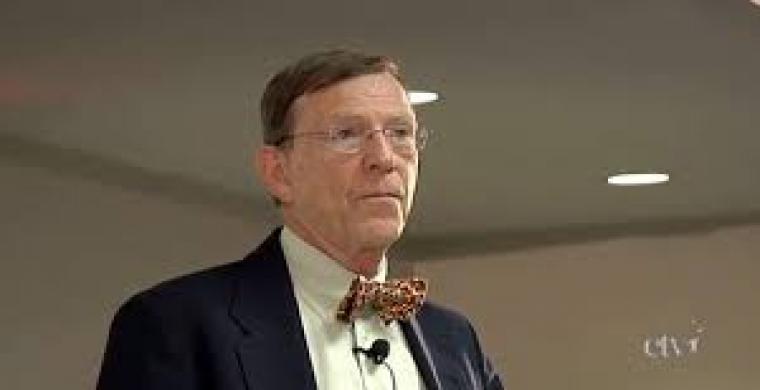ST GEORGE, SC: Popular S.C. historian Walter Edgar testifies in Episcopal trial
By Jennifer Berry Hawes
http://www.postandcourier.com/article/20140721/PC16/140729864?ref=email
July 21 2014
Historian, author and radio personality Walter Edgar testifies Monday in St. George during the trial between the national Episcopal Church and the Diocese of South Carolina. He said the local diocese has had a long history of accepting the laws of the national church. Historian, author and radio personality Walter Edgar testifies Monday in St. George during the trial between the national Episcopal Church and the Diocese of South Carolina. He said the local diocese has had a long history of accepting the laws of the national church.
Walter Edgar, a popular author known for his ETV Radio shows including "Walter Edgar's Journal," pointed to historic documents showing the local diocese has long accepted The Episcopal Church's laws. Wearing his standard bow tie, often quipping about his flagging eyesight and hearing, Edgar spent most of his time on the witness stand reading from historic documents.
The historic Christ Church in Mount Pleasant is among more than $500 million in church properties at stake in a lawsuit between the national Episcopal Church and the Diocese of South Carolina, led by Bishop Mark Lawrence.
For instance, the longtime University of South Carolina history professor pointed to the so-called "accession clause," which said the local diocese "accedes to and adopts the constitution and canons of the General Convention." The diocese later removed that language when it left the national church.
Edgar also pointed to the national church's role in the decision to split the South Carolina diocese to create the Upper Diocese of South Carolina. The bishop in 1920 noted that "division under our church law is not possible until the next General Convention," referring to the church's top governing body.
The nature of that relationship is at the center of a trial in its third week of testimony.
Bishop Mark Lawrence and about two-thirds of parishes in the formally called Protestant Episcopal Diocese of South Carolina left The Episcopal Church in 2012 after years of disputes over theology and administrative control.
Circuit Judge Diane Goodstein is presiding over the non-jury trial stemming from a lawsuit the diocese filed to retain property and identifying names and marks. She has allowed Lawrence's group to use the diocese's property and identity while the issue is in court.
The diocese and parishes that remain with the national church are temporarily calling themselves The Episcopal Church in South Carolina, led by Bishop Charles vonRosenberg.
Lawrence's group contends the diocese was a voluntary member of The Episcopal Church, the American province of the global Anglican Communion. Through freedom of association, it also can voluntarily withdraw, said the Rev. Jim Lewis, canon to Lawrence.
For instance, the diocesan bishop in 1849 compared The Episcopal Church to a confederacy of parishes. "Each diocese is in some respects independent of the confederacy," the bishop said.
However, the national church contends The Episcopal Church is hierarchical, so its dioceses cannot simply leave without its consent.
Edgar also noted financial aid that national church entities have provided the diocese, such as stipends to clergy and $100,000 after Hurricane Hugo and more than $40,000 after the 1886 earthquake to repair churches that now have withdrawn from it.
However, he did not research how much money the diocese, in turn, gave the national church.
"Could have been as much as 900 percent of money going the other way," said Alan Runyan, attorney for Lawrence's group.
END














